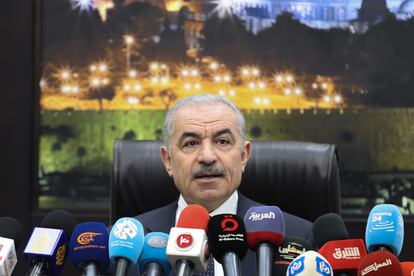Palestinian prime minister submits government’s resignation, a move that could open door to reforms
The move signals a willingness by the Western-backed Palestinian leadership to accept a shake-up that might usher in reforms sought by the United States

The Palestinian prime minister announced the resignation of his government on Monday, paving the way for a shake-up in the Palestinian Authority, which the U.S. hopes will eventually take on a role in postwar Gaza.
Many obstacles remain to making a revamped Palestinian Authority a reality. Palestinian President Mahmoud Abbas, whose forces were driven from Gaza by Hamas in 2007, has made clear that he would like the PA to govern the enclave after the war. But it is deeply unpopular among Palestinians, and Israeli Prime Minister Benjamin Netanyahu has roundly rejected the idea of putting the authority in charge of the territory.
Abbas must still decide whether he accepts the resignations of Prime Minister Mohammad Shtayyeh’s government. But the move signals a willingness by the Western-backed Palestinian leadership to accept a shake-up that might usher in reforms sought by the United States, as international negotiations ramp up to bring about a cease-fire. The authority, created under interim Israeli-Palestinian peace deals in the early 1990s, administers parts of the West Bank but is beset by corruption.
“The next stage and its challenges require new governmental and political arrangements that take into account the new reality in the Gaza Strip,” Shtayyeh said at a Cabinet meeting.
Netanyahu has vowed to destroy the military and governing capabilities of Hamas — which has ruled Gaza since 2007 and staged the Oct. 7 attack on Israel that set off the current war. He has called for Israel to maintain open-ended security control in the territory after the conflict, with Palestinian officials in charge of civilian affairs.
The Palestinians have rejected such a limited role and seek an independent state in the West Bank, east Jerusalem and Gaza — areas captured by Israel in the 1967 Mideast war.
Abbas is expected to choose Mohammad Mustafa, chairman of the Palestine Investment Fund, as the next prime minister. Mustafa is a U.S.-educated economist who has held senior positions in the World Bank and served in senior posts in the Palestinian Authority. Palestinian officials say he has a good, longstanding working relationship with American officials.
Sign up for our weekly newsletter to get more English-language news coverage from EL PAÍS USA Edition
Tu suscripción se está usando en otro dispositivo
¿Quieres añadir otro usuario a tu suscripción?
Si continúas leyendo en este dispositivo, no se podrá leer en el otro.
FlechaTu suscripción se está usando en otro dispositivo y solo puedes acceder a EL PAÍS desde un dispositivo a la vez.
Si quieres compartir tu cuenta, cambia tu suscripción a la modalidad Premium, así podrás añadir otro usuario. Cada uno accederá con su propia cuenta de email, lo que os permitirá personalizar vuestra experiencia en EL PAÍS.
¿Tienes una suscripción de empresa? Accede aquí para contratar más cuentas.
En el caso de no saber quién está usando tu cuenta, te recomendamos cambiar tu contraseña aquí.
Si decides continuar compartiendo tu cuenta, este mensaje se mostrará en tu dispositivo y en el de la otra persona que está usando tu cuenta de forma indefinida, afectando a tu experiencia de lectura. Puedes consultar aquí los términos y condiciones de la suscripción digital.








































